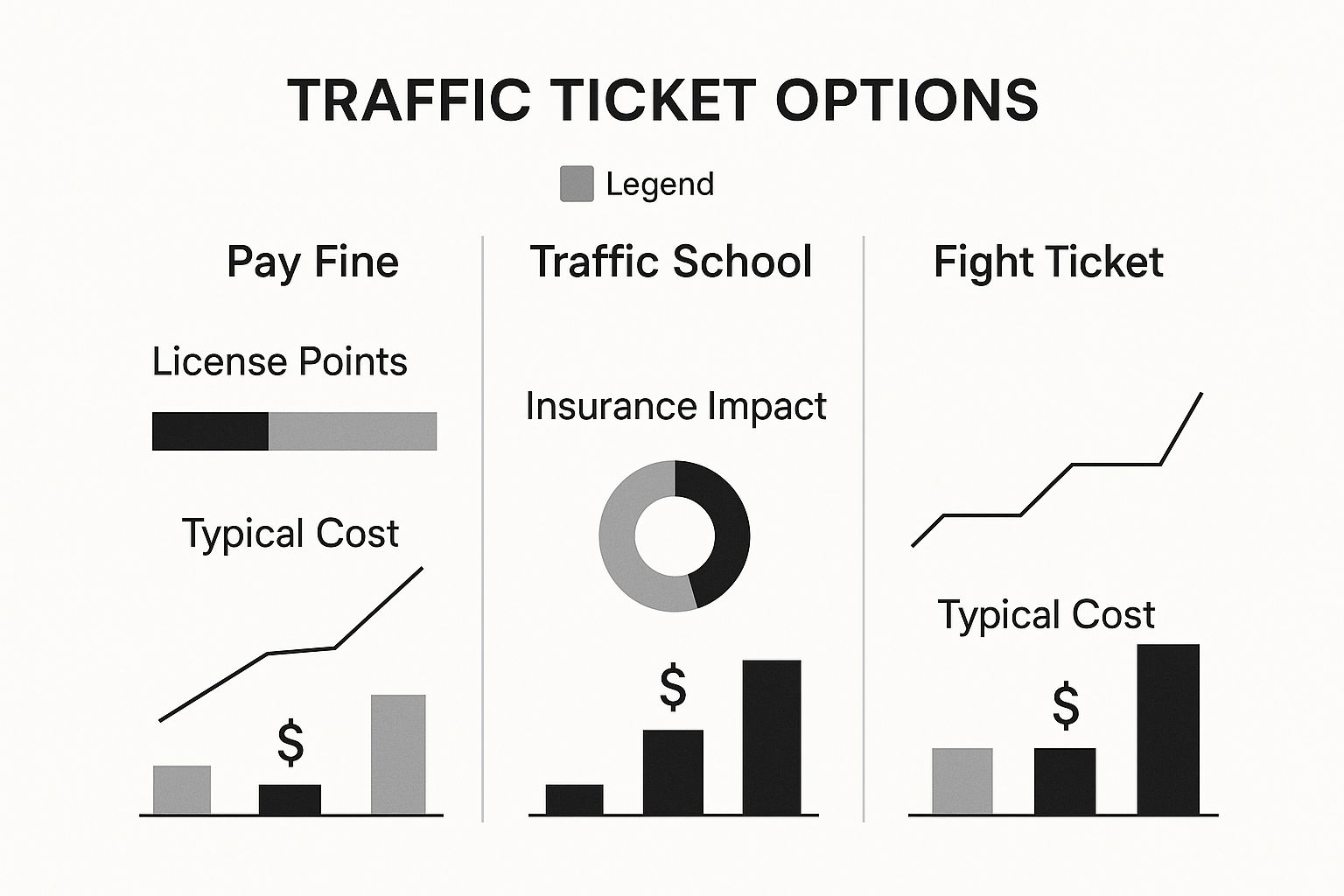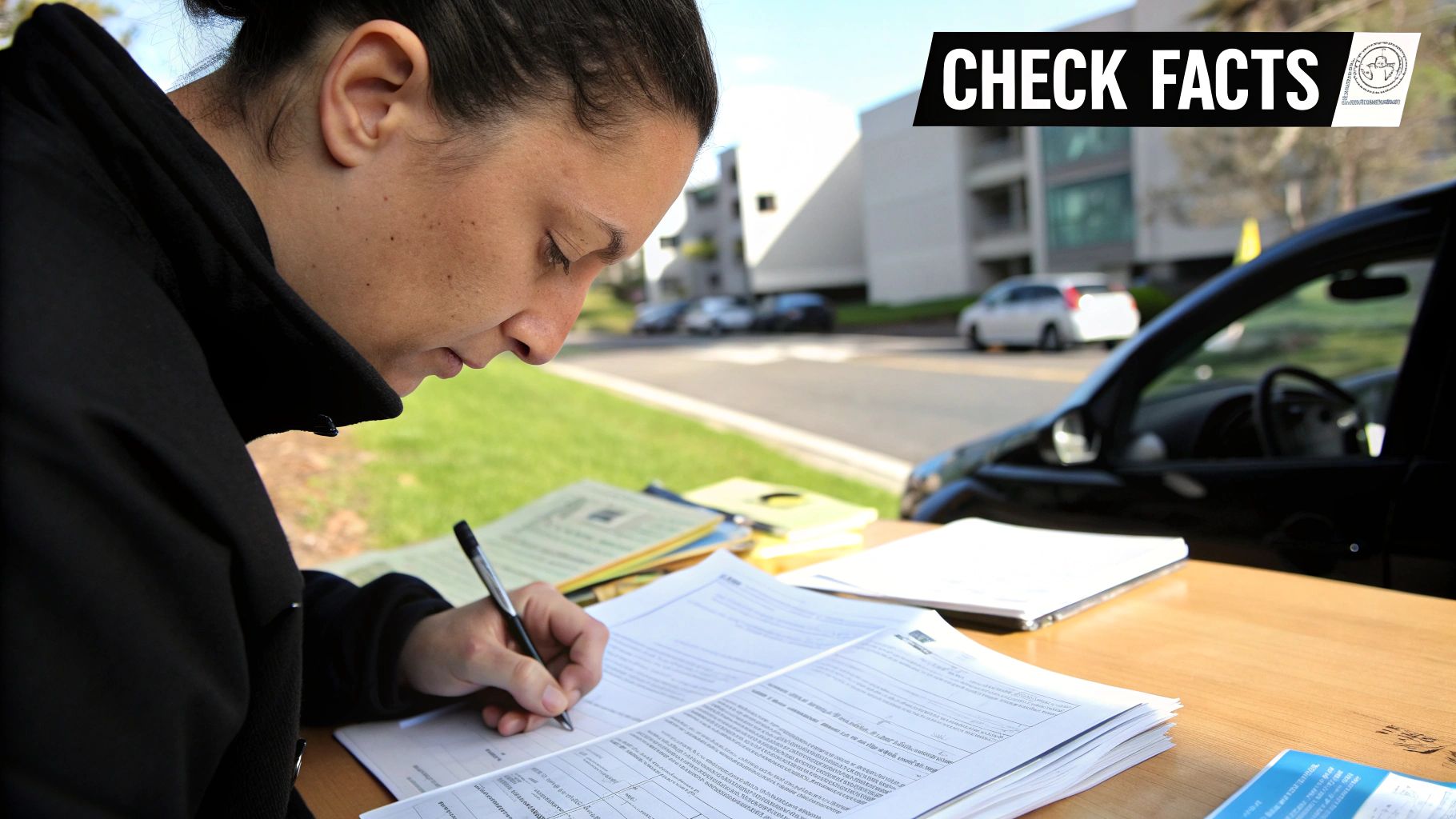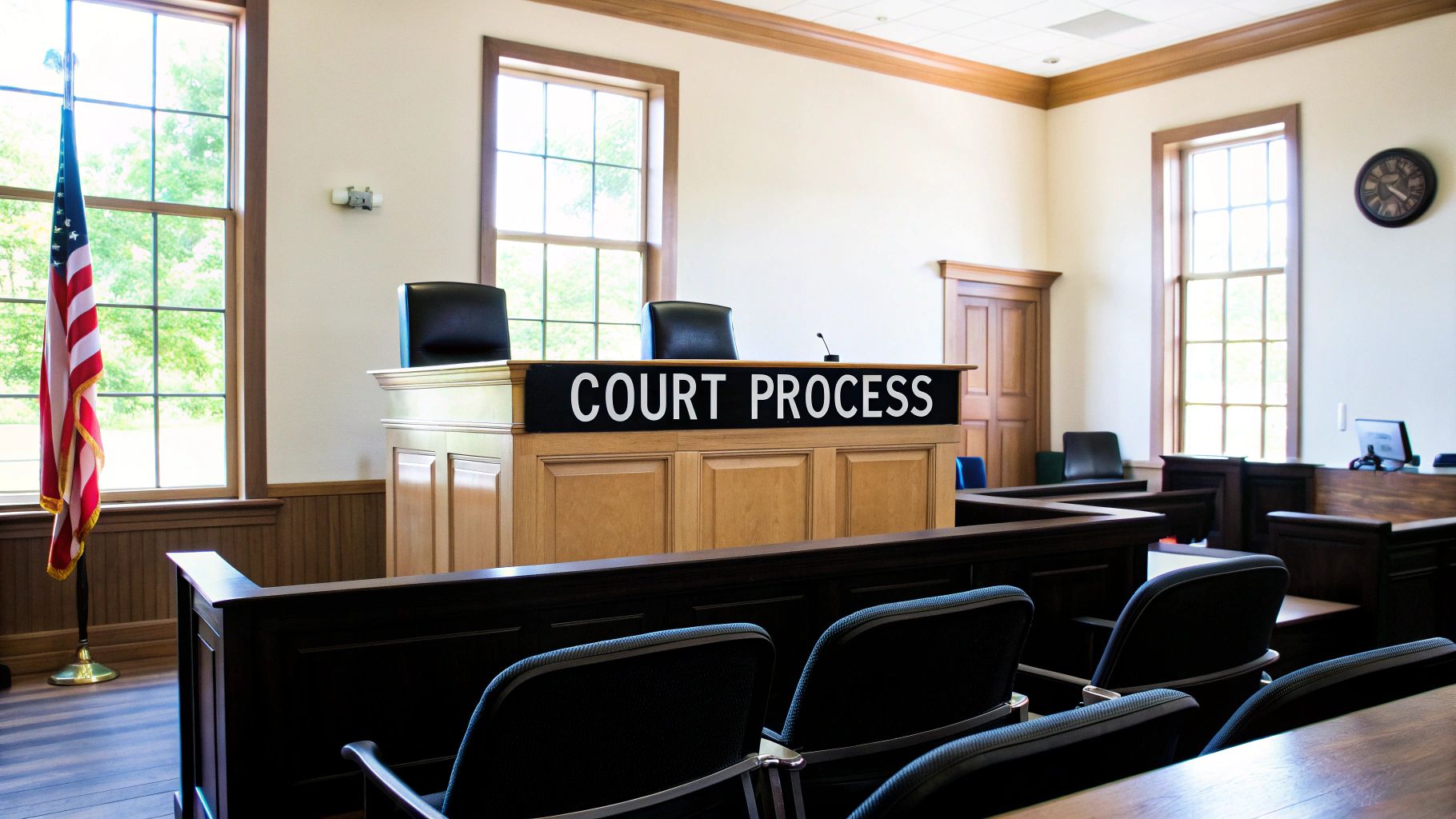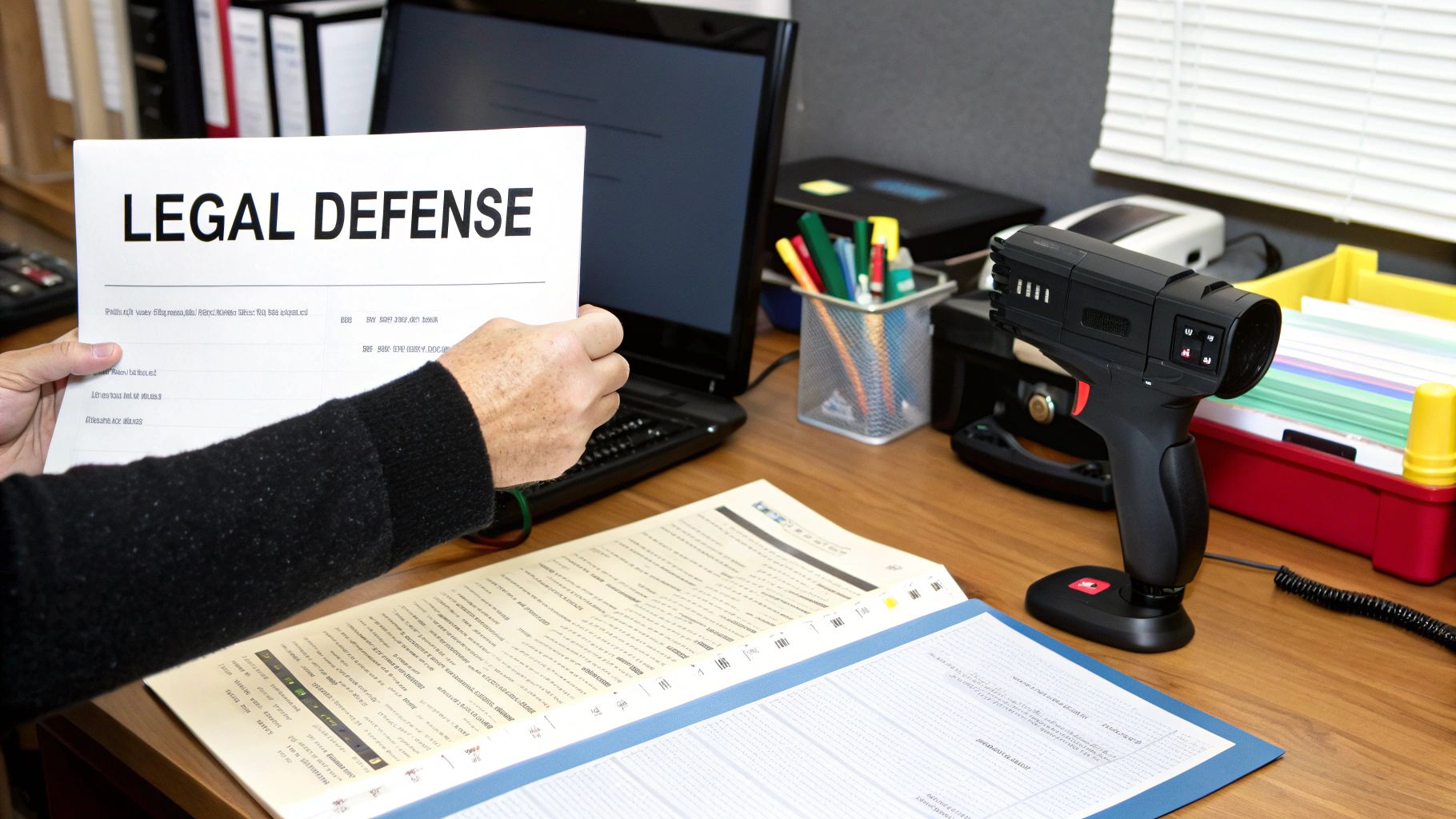
How to Fight a Traffic Ticket in Florida: A Comprehensive Guide
Learn how to fight traffic ticket in Florida. Our expert guide covers your options, court process, and defenses to help you succeed and protect your record.
So, you’ve got a Florida traffic ticket sitting on your passenger seat. What now? It’s a moment most drivers dread, but your next move is critical—and just paying the fine is rarely your best option.
You have three choices: pay the fine and accept the points, attend traffic school (if you’re eligible), or fight the traffic ticket to protect your record. Each path has real, long-term consequences for your insurance rates and even your license.
What to Do After Getting a Florida Traffic Ticket
Before you do anything else, read the citation carefully. It's more than just a piece of paper; it’s a legal document. You'll find the exact violation, the county court handling your case, and most importantly, your deadline to respond—usually 30 days in Florida.
Letting that deadline pass is a guaranteed way to make a bad situation worse. You could face a potential license suspension and additional fines.
Once you know the what, where, and when, it's time to decide how to handle it. An impulsive decision, like paying the fine just to get it over with, often backfires when your insurance bill arrives.
Weighing Your Three Core Options
Let's break down what each choice really means for you.
Paying the fine seems like the easiest way out. But it's also a legal admission of guilt. That means points go on your license, and your insurance company will likely notice when it's time to renew your policy.
Traffic school is another possibility. If you qualify, completing a state-approved course keeps the points off your record. The catch? You can only use this option five times in your entire life and no more than once every 12 months. Plus, you still have to pay the full fine and the cost of the school.
Then there's the third option: fighting the ticket. This means pleading not guilty and challenging the citation in court. It takes more effort, but a favorable outcome—like a dismissal or a reduced charge—could mean no points, no conviction, and no impact on your insurance. Our goal is to protect your license and record.
Attorney Advertisement. Office in Broward. Past results do not guarantee future outcomes. Contesting your ticket is often the only way to pursue a dismissal and avoid the long-term financial consequences of a conviction.
The infographic below puts the outcomes side-by-side.

When you look at it that way, it's clear that fighting the ticket is the only route that gives you a chance at avoiding both points and higher insurance premiums. Those points can stick around for a while, too. You can learn more about exactly how long traffic tickets stay on your record in our guide.
Your Options for a Florida Traffic Ticket at a Glance
To make it even simpler, here's a quick breakdown of what you're facing with each choice. Think of it as a cheat sheet for protecting your driving record.
Action | Points on Record | Impact on Insurance | Long-Term Considerations |
|---|---|---|---|
Pay the Fine | Yes (Conviction) | Very likely to increase rates | The conviction stays on your record, affecting future tickets. |
Elect Traffic School | No (Adjudication withheld) | Unlikely to increase rates | You pay the fine plus school fees. Limited to 5 uses in a lifetime. |
Fight the Ticket | Potentially No (If dismissed) | Potentially No (If dismissed) | Offers the only chance to avoid all negative consequences. |
Ultimately, fighting the ticket is the only proactive step you can take to keep your record clean and your insurance costs down.
Evaluating Your Case Before You Decide to Fight

Before you decide to fight a traffic ticket, you need to take a step back and look at the situation with a clear head. It’s about a cold, hard look at the facts to figure out if you have a solid case.
Your first move? Treat the ticket itself like a piece of evidence. Go over it with a fine-tooth comb.
Look for any mistakes, no matter how tiny they seem. Is your name spelled right? Is the make, model, or license plate of your car correct? What about the location, date, and time? Small slip-ups and inaccuracies on the citation can sometimes be enough to challenge its validity in court.
Recalling the Details of the Traffic Stop
Next, rewind the tape in your mind and walk through the traffic stop again. The little details you remember can make or break your defense. Your memory is a powerful tool here, so try to reconstruct exactly what was happening when the alleged violation occurred.
Think about these specific factors:
Weather Conditions: Was it a downpour? Was the sun causing a blinding glare? Heavy fog? Anything that could have realistically obscured a traffic sign or your view is important.
Road Conditions: Were the lane markings so faded they were barely visible? Was a sign hidden behind a tree branch? Did a massive pothole force you to swerve?
Traffic Flow: Was everyone else driving erratically? Did you have to make a split-second decision to avoid a collision?
The Officer's Procedure: Did the officer clearly state why they pulled you over? If they used a radar or laser gun, did you actually see them use it?
These aren't just random questions; they help build the full story. A strong defense is often built on the inconsistencies that prove the ticket doesn't tell the whole truth.
Attorney Advertisement. Office in Broward. A thorough review of your ticket and the circumstances surrounding it is the first step an attorney takes. Our goal is to protect your license and record by identifying every potential weakness in the case against you.
Addressing Tickets From Automated Enforcement
Red-light and speed camera tickets are a different type of violation. Since a machine caught the violation, the human element of a traffic stop is gone. But that doesn't mean these tickets are unbeatable.
With automated tickets, the defense strategy often pivots to the technical side of things. For instance, you can question if the camera was properly calibrated and regularly maintained. Florida law also requires clear warning signs leading up to a camera-enforced intersection—were they visible?
Automated Traffic Enforcement (ATE) is getting smarter, with AI-powered cameras becoming more common. While these systems are designed to be highly accurate, they still have to follow strict legal rules. Plus, there are ongoing public concerns about privacy and whether this is just a way to generate revenue.
At the end of the day, this initial review helps you gauge the strengths and weaknesses of your position. It’s about deciding if the potential long-term savings in insurance and fines are worth the fight. For a much deeper dive, check out our guide on when it is worth hiring a lawyer vs. paying the traffic ticket.
Navigating the Florida Traffic Court System

The idea of going to court can be intimidating. But when you decide to fight a traffic ticket, understanding the road ahead makes the whole experience a lot less stressful. Florida’s court system handles traffic violations in a few different ways, depending on how serious the offense is. Figuring out which path your ticket will take is the first step in building a solid defense.
Most of the tickets people get—think speeding or rolling through a stop sign—are considered civil traffic infractions. These are non-criminal violations that are sorted out in traffic court, where a judge simply decides whether you committed the infraction or not.
Then there are the more serious offenses. Things like Reckless Driving or leaving the scene of an accident are classified as criminal traffic violations. These cases are handled with the full weight of the criminal justice system and can lead to jail time and a permanent criminal record, not just fines and points.
The Civil Traffic Court Process
For a civil infraction, the process kicks off the moment you plead "not guilty" and request a hearing. You have to do this within 30 days of getting the ticket. Once that's done, the court clerk will put you on the schedule for a hearing.
This isn't a complex trial. The main people involved will be you (or your lawyer), the judge, and the police officer who wrote the ticket. That officer essentially acts as the state's only witness, presenting their evidence to back up the citation.
Your job—or your attorney's—is to tell your side of the story. This isn't just about saying "I didn't do it." A real defense can involve:
Cross-examining the officer to find inconsistencies in their testimony.
Presenting your own evidence, like photos from the scene, diagrams, or dashcam video.
Challenging the equipment the officer used, like the radar or laser gun.
The judge hears both sides and then makes a call based on what was presented. If they find the state didn't prove its case, your ticket gets dismissed.
Attorney Advertisement. Office in Broward. The courtroom has its own set of rules and procedures that have to be followed to the letter. Having legal representation means your case gets presented effectively and professionally, which may lead to a more favorable outcome. Past results do not guarantee future outcomes.
Courtroom Etiquette and What to Expect
Believe it or not, how you present yourself in court really does matter. Always be respectful to the judge and court staff. Dress appropriately—business casual is a safe choice—and always address the judge as "Your Honor."
When your case is called, you'll go up and stand before the judge. The key is to stay calm, speak clearly, and just stick to the facts. Getting emotional or blaming the officer won't help your case. A logical, fact-based argument is what persuades a judge.
For most civil traffic tickets, an attorney can go to court for you, which saves you the time and stress of having to show up yourself. This is a huge advantage. It lets a professional who knows the system handle everything while you go about your day.
How a Traffic Attorney Can Strengthen Your Defense
Deciding to fight a traffic ticket is a proactive first step. But trying to go it alone can be challenging. This is where bringing in a law firm where the practice focuses on traffic defense isn't just helpful—it can be a game-changer.
You’re not just hiring someone to talk for you. You’re getting a professional with deep procedural knowledge who knows exactly how to build a strong defense for your specific situation.
An experienced attorney brings a sharp, objective eye to your case. They know precisely what to look for on that citation, from minor clerical errors to potential legal flaws in how the officer documented the stop. These are the kinds of details most people would never catch, but they can be the very foundation for getting a ticket dismissed.
And let’s be honest, the convenience is a huge benefit. For most civil traffic tickets in Florida, your attorney can show up in court for you. No taking a day off work. No scrambling for childcare. No dealing with the stress of a courthouse. You get to carry on with your life while a professional handles all the legal legwork.
Tapping Into Local Court Knowledge
Every courthouse in Florida has its own rhythm and procedures. An attorney who is in those courtrooms day in and day out understands the local landscape in a way you simply can't learn from a book. They know the tendencies of certain judges and the negotiating styles of the local law enforcement officers.
This familiarity is a powerful tool.
It lets your attorney anticipate how things are likely to go and tailor their strategy before ever stepping into the courtroom. They know which arguments resonate with which judges and can often get cases resolved favorably in pre-trial discussions, sometimes without a formal hearing even being necessary.
This local knowledge is especially crucial for specific violations. For example, if you need a speeding ticket lawyer, you want someone who understands the technical requirements for radar and laser evidence in that jurisdiction. That familiarity can open up unique defense angles you'd never find on your own.
A Cost-Benefit Analysis
It’s easy to hesitate at the thought of paying a lawyer. But it’s critical to see it as an investment, not just another bill. Think about the real, long-term financial damage that comes from just paying the ticket and accepting the conviction.
Fines and Court Costs: This is just the beginning. It's the immediate hit to your wallet.
Increased Insurance Premiums: A moving violation can make your insurance rates jump. This could mean hundreds, or even thousands, of extra dollars you'll pay over the next 3 to 5 years.
Points on Your License: Accumulating too many points can lead to a license suspension. That can seriously impact your ability to get to work and live your life.
When you stack up the one-time attorney's fee against those long-term, compounding costs, the math becomes pretty clear. The goal isn't just to deal with this one ticket—it's to protect your driving record and avoid those future financial hits.
Attorney Advertisement. Office in Broward. Hiring an attorney is about more than just one ticket; it’s about protecting your driving record for the future. Our goal is to seek the best possible outcome for your case. Past results do not guarantee future outcomes.
Ultimately, a traffic attorney's job is to level the playing field. The state has a prosecutor and a police officer on its side. Having a dedicated legal professional on your team ensures your rights are protected and your side of the story is presented in the strongest possible way.
To see how we can help with your specific ticket, reach out for a free consultation. Submitting information via our forms does not create an attorney-client relationship.
Common Defense Strategies for Florida Traffic Tickets

So, you’ve decided to fight your traffic ticket. Good. But simply telling a judge "I didn't do it" isn't going to be enough. A real defense is built on solid legal arguments that poke holes in the evidence the state has against you. Once you understand the playbook, you'll see that a citation is far from an automatic conviction.
Many successful defenses boil down to questioning the tech and the tools used by law enforcement. When it comes to speeding tickets, the accuracy of the speed detection device—whether it's a radar gun, laser (LIDAR), or something else—is everything.
We can challenge whether that specific device was properly calibrated, maintained, and even operated exactly as the manufacturer intended. They have very strict guidelines for a reason.
A smart first move is to request the calibration and maintenance logs for the exact device that clocked you. If those records are missing, incomplete, or show the device was past its service date, it immediately casts doubt on the accuracy of the speed reading. That’s often a key part of the defense.
Questioning the Officer’s Observations and Procedures
It’s not always about the tech. A powerful defense can be built around the citing officer's own actions and observations during the stop. Officers are human, and their judgment isn't foolproof—it can absolutely be challenged in court.
Think about it: Did the officer actually have a clear, unobstructed line of sight when the alleged violation happened? In busy traffic, it's surprisingly easy to get a bad reading from a radar gun when it’s tough to isolate just one car. This is often called a “pacing” or “tracking” error. And visual speed estimates can be unreliable and are often challengeable.
Other common arguments we explore include:
Mistake of Fact: This is where you argue that you made a reasonable and honest mistake. For instance, maybe a stop sign was completely hidden by an overgrown tree branch, making it impossible for even the most careful driver to see it.
Legal Necessity: This is a rarer defense, but it applies when you had to break a traffic law to prevent a much more serious danger, like swerving over a line to avoid a head-on crash.
Attorney Advertisement. Office in Broward. Identifying the right defense strategy requires a detailed analysis of your specific case. Our practice focuses on traffic and DUI defense, allowing us to pinpoint the most effective arguments to protect your driving record.
The Financial Stakes of a Conviction
Let's be real—fighting a ticket is also a financial decision. Every year in the U.S., millions of drivers get a speeding ticket, which adds up to billions in revenue. The fine on the ticket is just the beginning.
Those points on your license can jack up your insurance premiums for years. Suddenly, that one ticket is costing you way more than the initial fine.
Ultimately, having a well-prepared defense makes all the difference. Knowing the potential angles of attack is your first step toward getting a much better outcome. To get a better feel for your specific situation, check out our insights on the chances of getting a speeding ticket dismissed right here in Florida.
Your Top Questions About Fighting Florida Traffic Tickets, Answered
Getting a traffic ticket is frustrating, and deciding whether to fight it brings up a ton of questions. You’re probably wondering about the cost, the time commitment, and what could happen if things don’t go your way. Let's tackle some of the most common concerns we hear from Florida drivers every day.
Keep in mind, this is general information, not formal legal advice. For questions specific to your situation, a free consultation with a licensed attorney is the best place to get answers.
Is It Really Worth Fighting a Traffic Ticket in Florida?
This is the big one. In many cases, it is. Whether it’s the right move for you depends on the violation, your driving history, and what a conviction will do to your insurance premiums.
For many drivers, contesting a ticket is a smart financial decision in the long run. Points on your license can affect you for years, leading to higher insurance rates. An attorney can look at the specifics of your ticket and give you a straightforward assessment of what makes the most sense. Our goal is always to achieve the best possible outcome for you.
(Disclaimer: Past results do not guarantee future outcomes.)
Do I Have to Show Up in Court if I Hire an Attorney?
Here’s some good news. For the vast majority of civil traffic tickets in Florida, your attorney can appear in court for you. This is a huge relief for most of our clients. You don't have to take a day off work, find a babysitter, or sit around a courthouse all day.
The exception is usually for more serious criminal traffic violations. In those cases, the judge will likely require you to be there. This is a critical detail we’ll cover with you right away in your initial consultation.
What Happens if I Fight My Ticket and Still Lose?
It's a fair question. If you go to a hearing and the judge finds you committed the infraction, you'll likely have to pay the original fine plus court costs. The biggest downside is that you might lose the option to elect traffic school to keep the points off your record.
But this is where having an experienced attorney really helps. Even if a complete dismissal isn't on the table, we can often negotiate a better deal, like pleading to a lesser offense with no points. We'll walk you through all the potential scenarios so you know exactly what to expect.
How Much Does a Traffic Ticket Attorney Cost?
The cost depends on the complexity of your ticket. The good news is that for most common infractions, we work on a simple, flat-fee basis. You’ll know the exact cost upfront—no surprises.
Think of it as an investment. You're weighing a one-time attorney fee against the long-term pain of a conviction. A single ticket can easily cost you hundreds, or even thousands, in increased insurance premiums over the next few years. We offer a free consultation to break down the costs for your specific case and show you how we can help.
(Submitting your information for a consultation does not create an attorney-client relationship.)
A Quick Tip from the Pros. Beyond legal strategy, sometimes the best defense is preventing a ticket in the first place. Simple things can make a difference. For example, knowing how to clean your license plate for maximum visibility can help you avoid an unnecessary traffic stop that could lead to other issues.
Ready to put this ticket in your rearview mirror? The team at Ticket Shield, PLLC is here to protect your driving record. Submit your ticket online 24/7 for a free, no-obligation consultation at https://www.ticketshield.com.


